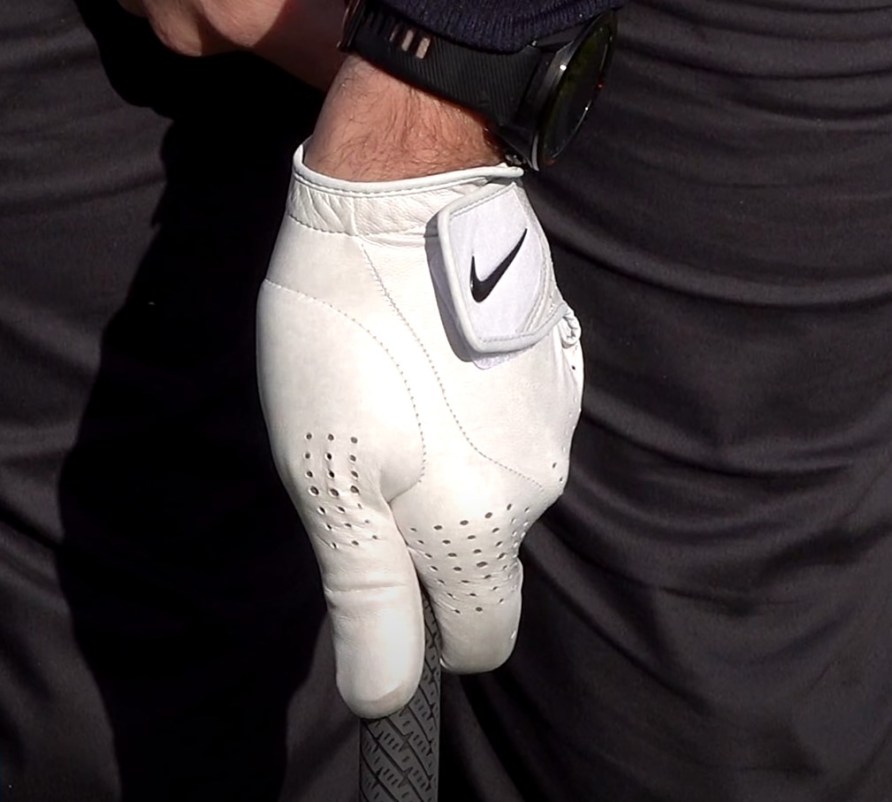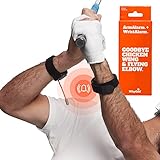Driving the ball is one of the most crucial aspects of learning how to play golf. It involves hitting the ball with maximum power and accuracy off the tee, allowing the player to gain maximum distance and position on the fairway. In this guide, I’ll show you exactly how to drive a golf ball and improve your swing.
Below, we go over:
The correct grip and stance for hitting driver shots straight
Common mistakes to avoid when driving the ball
to help you on the golf course
A strong drive sets the tone for the rest of the hole, making hitting the green and scoring easier. Whether you are a beginner or an experienced golfer, mastering the art of driving the ball can significantly improve your game.
Let us know if you have additional questions about driving the golf ball!
The Best Grip For Driving the Ball

Finding the proper grip is crucial for a successful drive in golf. But, there is only sometimes a perfect grip that every golfer in the world follows. It largely depends on the individual’s hand size, comfort level, and golf swing.
Some golfers are more comfortable with an overlapping grip, and some with an interlocking grip. A few golfers out there will even use the ten-finger baseball grip. For this article, we will explain using the interlocking grip because that is the grip that most players find success with.
Grab the club with your weaker hand (left hand for a right-handed golfer and right hand for a left-handed golfer). Rotate your hand over so you can see the first two knuckles of that hand. A “V” is formed between your thumb and index finger, which should be pointed towards your inside shoulder.

Bring your other hand onto the club with that hand’s thumb resting on top of the thumb already on the club. Another “V” is formed between the thumb and index finger and should also point towards the inside shoulder.
Interlock your index finger on the weak hand with the pinky finger on the top hand, with the top hand’s thumb pointing down the shaft. All of this is called a neutral grip on the club.

Take a few practice golf swings to see how everything feels!
Tips For Finding the Right Grip
The club should rest in the fingers of your hand, not the palm.
The grip pressure should be firm but not tight.
The thumbs should be pointing down the shaft of the club.
You may have a weak or strong grip if you find yourself constantly slicing or pushing the ball. To fix this, you need to open or close your grip by rotating your hands so you can only see the first two knuckles on each hand.
Finding the proper grip is a personal preference, so experiment with different grips to find the one that works best for you.
The Best Stance For Driving the Ball Straight

Like the grip, having a proper stance is crucial for achieving maximum distance and accuracy.
The first step is to position your feet shoulder-width apart and parallel to the target line. If you take one of your clubs and spread it across your left shoulder and right shoulder, it should point directly at your target.
Your weight should be evenly distributed between both feet, with slightly more pressure on your back foot.
Ensure you have enough distance between your feet. A narrow stance will not give you enough power when hitting your golf driver.
Next, bend your knees slightly and tilt your spine forward from your hips. Your arms should be extended but not locked, and your hands should be positioned just ahead of the ball.
Finally, ensure your head is neutral, with your eyes focused on the ball. With practice, this stance will become second nature and help you consistently hit long straight drives.

Tips For Finding the Right Stance
Position the ball to align with your left heel (right-handed golfers) or right heel (left-handed golfers). You want to make sure you are sweeping up on the ball to get it into the air and not hitting down on it like an iron.
Try and keep the weight on the balls of your feet and not on your heels. This will help you swing faster and ensure your body weight is proportioned.
Purchase an alignment stick and use it while at the driving range. This will ensure your feet are lined up correctly and you are aimed precisely where you want the ball to go.
Maintain a relaxed, comfortable posture throughout. If you are tense, it will throw your swing completely off the intended target line.
The Perfect Backswing on the Tee
An effective backswing is crucial to ensuring that your swing path is correct and your club face stays square. Maintaining a low and wide takeaway is essential, which helps prevent the club head from moving off the ideal swing plane line.
As you sweep your club straight back, you want to keep it as close to the ground as possible while shifting your weight to your back leg. Your wrists should be fully hinged at the top of your swing, and your body should be rotated to complete the backswing.
Tips For Improving the Backswing
Keep your left arm straight (right arm for left-handed golfers). This helps ensure you use your shoulders and body to generate power rather than just your arms.
Keep your outside arm snug to your body throughout the entire swing. This helps ensure you don’t do the chicken arm, which will slice the ball off-path. A trick I use is to put a golf glove right under your armpit or the outside arm. Keep the glove there the whole time during your swing without having it drop.
Rotate your shoulders as you bring the club back to create a full backswing.
Keeping your head still throughout the swing is essential to maintain your balance and accuracy.
The Ideal Golf Downswing
The downswing is the next step of the golf swing and an essential piece of hitting a golf ball long and straight. It begins with a weight shift from the back to the front foot as you rotate your hips and torso toward the target.
The arms should follow the body on the downswing, smoothly swinging down and through the ball. To avoid slicing or hooking the ball, keep your clubface square to the target line and your hands ahead of the clubhead at impact.
Practice this motion with a slow, steady tempo, and focus on making solid contact with the sweet spot of the clubface. The downswing is where you can add more power to your drives, where the swing speed increases the most.
This is also where amateur golfers struggle the most to hit straight. The entire upper body must work together for a fluid motion.
Tips For Improving the Downswing
Start the downswing with your lower body, not your arms.
Keep your head still and your eyes on the ball throughout the swing.
Maintain a smooth tempo on your club head speed and avoid rushing the swing.
Focus on swinging the club face through the ball, not at it.
Keep your left arm straight and extend it towards the target on the follow-through.
Using the above tips will have you driving the golf ball farther and increase your average driving distance.
Golf Driver Follow-Through
Regarding the follow-through in golf, there are a few key things to remember:
You want to ensure that your body is rotating through the shot, with your weight shifting onto your lead foot. This helps to generate power, distance, and a better launch angle.
You want to relax your arms and hands, allowing them to extend towards the target entirely.
Maintaining your balance and finishing in a stable position is essential, with your chest facing the target and your club pointing towards the sky.

Tips For Improving the Follow Through
Focus on an entire body rotation and maintaining a stable finishing position.
A good follow-through indicates a proper swing, so finish with the club behind your head or shoulders. Keep both elbows reasonably low and your weight resting on the front foot with the back heel lifted.
A stable finishing position with your chest facing your target will help generate more ball speed and better overall generated power.
Commons Mistakes to Avoid

Hitting the golf ball straight on a drive is one of the hardest things to master, and golfers make quite a few mistakes.
Open Golf Club Face
The first step to ensuring a square clubface is providing your grip is good. The clubface will stay open at impact if you have a weak grip. Turning your hands away from your target line will strengthen your grip and square up the clubface.
Poor Golf Swing Path
If your clubface is open or closed at impact, golfers will overcompensate to hit the ball by changing their swing path to account for a slice or a push. If you fix your club face first, it will then be easier to straighten out your swing path.
Too Narrow of a Stance
Quite a few amateur golfers will line up to drive the ball with the same stance they use to hit an iron. The issue is that the driver is the longest club in your bag. It creates the longest swing, and you need more room in your stance to control your swing correctly.
Keeping the Ball Too Far Back in Your Stance
If the ball is too far back in your stance when hitting the driver, you will hit the ball at the lowest point of your swing. You want to avoid hitting down on the ball when hitting the driver, as this will increase spin and decrease the distance.
Hitting up on the ball will launch the ball into the air for a straight drive.
Driver Swing Trainers
Several training tools exist to help you hit straighter shots off of the tee box with your driver. Take a look at buying one today and then use the practice tips below to improve your swing:
Arm Alarm
The Arm Alarm is a clever accessory that teaches you how to keep your wrists together and in unison throughout your golf swing. Not only does this teach you how to build a good outside-in golf swing, but it promotes more power in your swing.
SuperSpeed Golf Training System
For golfers who want to hit longer drives off the tee, the SuperSpeed has been highly rated for several years. It comes with three different weighted clubs, two lighter than a driver and one heavier. The included instructional videos teach you how to build up your driver swing to get more distance on every ball hit.
Tour Striker Planemate 2.0
The Planemate by Tour Striker helps you get proper rotation and club angle on your driver shots, which is the most common problem for golfers. It teaches you how to shallow out your club and get a good outside-in body rotation. If you master this, you can easily learn how to drive a golf ball.

Practice Tips
Following our step-by-step guide above will give you the best driving tips we can offer. The best way to consistently hit a good drive and avoid hitting bad ones is to hit the driving range and practice.
This is where you can bring all your swing thoughts out and find what works for your golf swing.
Golf requires physical skill, mental focus, and muscle memory. Practicing regularly helps develop these skills and improves muscle memory, allowing you to make consistent shots.
Practice also helps to identify areas of weakness in your game, allowing you to focus on improving them. Additionally, practicing under different conditions, such as on other courses or in different weather, challenges you to adapt to new situations and further develops your skills.
Ultimately, regular practice is essential for improving your golf game and achieving your goals on the course.
Driving a Driver vs. Iron

There are some critical differences between driving with a driver and going with an iron.
Firstly, the driver is a longer and lighter club than an iron, requiring a different swing. You should tee the ball higher with a driver and hit it on the upswing to maximize distance. The driver also requires a broader stance as the swing is longer due to a longer club.
Irons, on the other hand, require a more downward strike to draw spin and control. Additionally, the driver has a giant head, making it more forgiving on off-center hits, while iron shots require more precision and accuracy.
Finally, drivers are typically used for longer shots off the tee, while irons are used for shorter approach shots to the green with a different ball flight.
Deciding when to use a driver vs. an iron is a personal preference. Many golfers may be more consistent in finding the fairway with a long iron. There may also be hazards you are trying to avoid up ahead, so an iron allows for more lee-way to hitting a straight shot.
Video Help
If you still need help learning how to drive a golf ball, here are some of the best tutorials on the internet that you can follow.
Many of these teachers are found on our list of the best online golf courses to try out.
Conclusion
In our guide above, we reviewed all the steps required to hit a golf ball good with a driver. It starts with the grip and rolls into the backswing, downswing, and then follow through. You will hit better golf shots if you follow our tips and avoid common mistakes.
Mastering the golf drive is essential to improving one’s golf game. It requires a ton of physical skill and muscle memory on your swing. Regular practice is crucial to developing these skills and improving overall performance.
Ultimately, the golf drive is a foundational skill that sets the tone for the rest of the game. By dedicating time and effort to improving this skill, golfers can take their game to the next level and learn how to drive a golf ball straight.
Last update on 2026-02-16 / Affiliate links / Images from Amazon Product Advertising API



